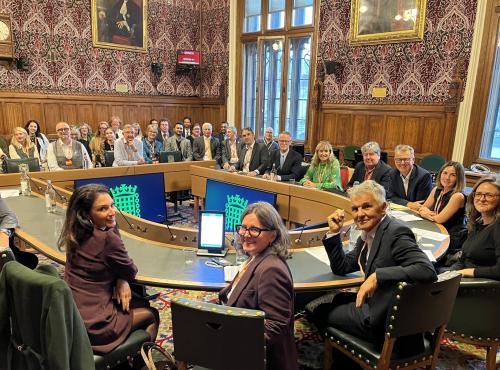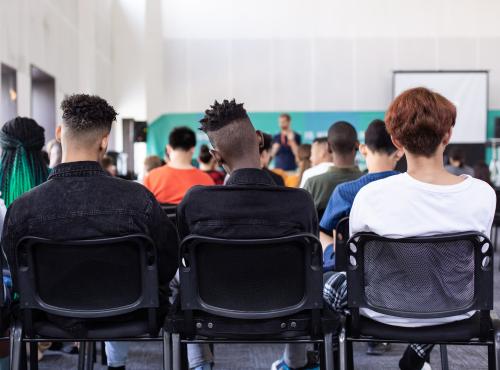New Horizons – How technology will change teaching and learning – FETL Summer Symposium 2019
FETL’s 2019 Summer Symposium explored the role of technology in FE and its potential to transform every aspect of teaching, learning and the education environment.
The impact of technology on the further education (FE) sector has been a recurring theme in FETL research publications. For example, contributions from Sir Michael Barber, Bob Harrison and Paul McKean focused on the implications of AI and digital skills gaps in the sector.
Held in the House of Commons in July 2019, the symposium brought together an audience of over 100 attendees, which included parliamentarians, civil servants, sector leaders, practitioners, academics and the wider policy community. The event was hosted by Lord Holmes of Richmond MBE, who had recently been appointed as Chair of the Department for Education EdTech Leadership Group.
The event began with a lunch reception and showcase of Virtual Reality technology. Guests donned a headset to enter the world of Natalie 4.0: software which allows users to explore what the day in the life of a student might look like in 2029. The project is created by Jisc as part of their thought leadership on education and the fourth industrial revolution. As Paul McKean explained “digital technologies including artificial intelligence, automation, the Internet of things and robotics will affect the way we work, rest and play”.
As well as giving us a glimpse into the future of education, other VR exhibits highlighted how the technology is already being used to help students develop vital skills. Denyse King, Lecturer at Bournemouth University, is researching the role of Virtual Reality Learning Environments (VRLEs) in helping teach skills in healthcare (the CILVRS project); she has written content on safeguarding which has then been to her specifications by tech company Daden Ltd. As Denyse explained she was able to share this technology with symposium delegates to show how:
VRLE offer Further Education and Higher Education level healthcare students the means to access and revisit learning materials in ways which enhance the educational offer, student and patient experience. […] use of VRLE mean educational institutions can offer students clinical experiences which cannot otherwise be guaranteed as routine part of their healthcare education. […] VRLE also have a place in offering realistic clinical experiences for CPD.
The symposium was chaired by Lord Holmes who has been appointed by the DfE as Chair of the EdTech Leadership Group, supporting the delivery of the 2019 EdTech Strategy. In his opening remarks, Lord Holmes focused on the impact that technology can make in FE: “technology doesn’t need to be magical, certainly should never be mystical. It should never be in search of a solution. It should be sufficient and it should be there to solve a problem.”
As Dick Palmer explained in his remarks, the college of the future may look very different but the technology will serve the pedagogues and purposes we recognise and value today. Speaking about the power of AI to support self-directed learning he said “I think for FE, one of our greatest, best strengths is our ability to differentiate for our students and self-directed learning [using AI] is just a part of that.”
As we consider the 2019 EdTech Strategy it’s important to learn the lessons of past efforts to bring technology in the skills system. Dick Palmer, who has worked on EdTech in FE as far back as the BBC Microcomputer, reflected on past initiatives:
I sat on the government’s Science Foresight panel. We were looking at something called Learning 2020. We published a document describing how education was going to look in 2020. I think looking back on that document now is fascinating, because one of our projections was there wouldn’t be colleges as we know it now in 2020, and in fact people would be learning in Nike Town, and that retail outlets would be the place for learning. We clearly didn’t get that one right!
Though predictions about the ways FE will be shaped by technology have not always come to pass, this does not mean that technology has yet to make its mark on the sector.
As Lord Holmes set out in his opening remarks “the kit is only as good as the training and the people who are behind it”. This theme was echoed in subsequent contributions and, in particular, speakers emphasised the importance of winning over and motivating teaching staff. As Deborah Millar explained, staff often remark that they “don’t know where to start” when it comes to technology. Drawing on her own practice as a learning technologist, she stated that:
I need to win your heart and your mind as a teacher. You do not want to know about this technology, but if I talk to you in teaching terms, and I say, ‘Your assessment, the feedback will be far richer. The student can access it at any time, and it will reduce the amount of time that you do by marking,’ then I hopefully win your heart. Now, if you’re one of these not-so engaged members of staff and I win your heart, you will shout it from the mountains.
While all staff have a role to play in EdTech, the position of learning technologists was identified as crucial for the success of this agenda in FE. Dame Ruth Silver DBE (FETL) asked panellists how learning technologists can come together to “contribute to the leadership of this system, rather than institutional initiatives and individual pathways?” and “where does this come together as a family, as a system of development, for new technology in education?”



